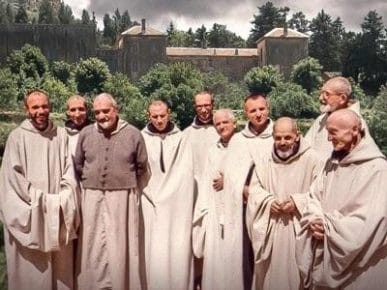
Jan 23, 2017 | Focolare Worldwide, Senza categoria
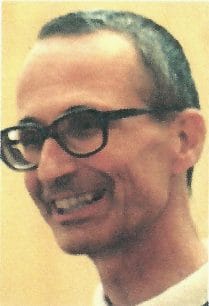 I came across a letter of Fr. Christian de Chergé a few days ago, on his 20th death anniversary. Christian was the Prior of the community of Trappist monks of the monastery of Nostra Signora dell’Atlas in Tibhirine (90 km from Algiers). In 1996, he and six other monks were kidnapped and then killed. On 1 August, Bishop Pierre Claverie, the Bishop of Orano was killed. That was really a “black decade,” as people called the civil war that exploded in the1990s. The monks were French and like the other “foreigners” were the direct targets of the “ mountain brothers,” name that referred to all those who had gone into hiding to take up their arms following the annulment of the 1992 elections. The Islamic Salvation Front, a political party that was dispersed and declared illegal, was about to win the elections. In my mind I often see their smiling faces, during those moments we lived together. We all took part in that particular vocation of the Church in that country, to which we felt we had been sent to testify to the Gospel, at the service of those people. It was a simple, poor Church, but its testimony shone in the hearts of many friends, mostly Muslims. Already then in Algiers, 99.99% of the population followed Islam. The Archbishop of Algiers, Paul Desfarges, said that, “The Church is for the people, a Church of Encounters.” But going back to the letter of 3 December 1994, it seemed to me like meeting Christian once again, or one of the monks in our focolare house in Tlemcen, where they used to spend a night, to then resume the journey towards the monastery they were about to found in Fèz, Morocco. Those were evenings of intense dialogue and joy of getting together, feeling like brothers and of sharing and understanding, in this mutual commitment toward the people that hosted us. Even if we had different callings, our hearts beat in unison.
I came across a letter of Fr. Christian de Chergé a few days ago, on his 20th death anniversary. Christian was the Prior of the community of Trappist monks of the monastery of Nostra Signora dell’Atlas in Tibhirine (90 km from Algiers). In 1996, he and six other monks were kidnapped and then killed. On 1 August, Bishop Pierre Claverie, the Bishop of Orano was killed. That was really a “black decade,” as people called the civil war that exploded in the1990s. The monks were French and like the other “foreigners” were the direct targets of the “ mountain brothers,” name that referred to all those who had gone into hiding to take up their arms following the annulment of the 1992 elections. The Islamic Salvation Front, a political party that was dispersed and declared illegal, was about to win the elections. In my mind I often see their smiling faces, during those moments we lived together. We all took part in that particular vocation of the Church in that country, to which we felt we had been sent to testify to the Gospel, at the service of those people. It was a simple, poor Church, but its testimony shone in the hearts of many friends, mostly Muslims. Already then in Algiers, 99.99% of the population followed Islam. The Archbishop of Algiers, Paul Desfarges, said that, “The Church is for the people, a Church of Encounters.” But going back to the letter of 3 December 1994, it seemed to me like meeting Christian once again, or one of the monks in our focolare house in Tlemcen, where they used to spend a night, to then resume the journey towards the monastery they were about to found in Fèz, Morocco. Those were evenings of intense dialogue and joy of getting together, feeling like brothers and of sharing and understanding, in this mutual commitment toward the people that hosted us. Even if we had different callings, our hearts beat in unison.  That atmosphere of danger surrounding us, encouraged us to go ahead. In fact, there was talk about a possible momentous departure of the members of the focolare of Tlemcen, which then did not occur. And Christian had written: «We all thought that you would stay longer to testify to a convivial offer, a boundless sharing of life, and a friendly openness that enables our hearts to vibrate in unison beyond the barriers of religious affiliations. You made the message of the Gospel your very own and you have deeply imprinted this message among us. And we rejoice with you for this greater humanity which your Charism has given to our Church. It was such a joy to meet at your “focolare” house. Many monks were able to make use of your hospitality when they passed through on their way to Fez. All of us still savour the thought of experiencing it all again! In these times we all need to be able to count on this “fire” kept alive in the common room. It will be a bit colder at Christmas if you will no longer be here… Our lives are in God’s hands… and our motives to remain, conform to those that have allowed us to live here. For you, as for us, the situation has not changed. THANKS once again to each of you and our fraternal communion today and for always. Christian». We had talked about the courage to remain… but for those who, like us had lived that harsh situation in person, I would rather speak of the courage to remain faithful to a calling and share it with a section of humanity, which we already felt an integral part of. It was a Fidelity of love. In the hearts of those who knew the monks, Bishop Claverie, or the other nuns and religious killed in those years in Algiers, they continue to speak to us of the Gospel lived and deep friendships with a people they had made their own. Giorgio Antoniazzi
That atmosphere of danger surrounding us, encouraged us to go ahead. In fact, there was talk about a possible momentous departure of the members of the focolare of Tlemcen, which then did not occur. And Christian had written: «We all thought that you would stay longer to testify to a convivial offer, a boundless sharing of life, and a friendly openness that enables our hearts to vibrate in unison beyond the barriers of religious affiliations. You made the message of the Gospel your very own and you have deeply imprinted this message among us. And we rejoice with you for this greater humanity which your Charism has given to our Church. It was such a joy to meet at your “focolare” house. Many monks were able to make use of your hospitality when they passed through on their way to Fez. All of us still savour the thought of experiencing it all again! In these times we all need to be able to count on this “fire” kept alive in the common room. It will be a bit colder at Christmas if you will no longer be here… Our lives are in God’s hands… and our motives to remain, conform to those that have allowed us to live here. For you, as for us, the situation has not changed. THANKS once again to each of you and our fraternal communion today and for always. Christian». We had talked about the courage to remain… but for those who, like us had lived that harsh situation in person, I would rather speak of the courage to remain faithful to a calling and share it with a section of humanity, which we already felt an integral part of. It was a Fidelity of love. In the hearts of those who knew the monks, Bishop Claverie, or the other nuns and religious killed in those years in Algiers, they continue to speak to us of the Gospel lived and deep friendships with a people they had made their own. Giorgio Antoniazzi
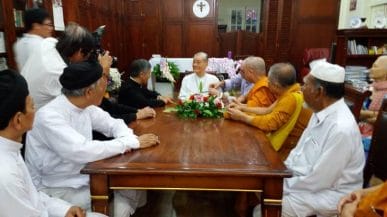
Jan 17, 2017 | Focolare Worldwide
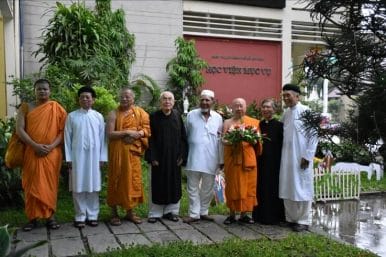 «These were days of ‘fire’, with the three monk-friends coming from Thailand: Phramaha Thongrattana Thavorn, Ajarn Suchart Vitipanyaporn, Bhikkhu Jayabhinunto and Mr. Khamphorn who accompanied them», Marcella and Luigi, Christian friends recounted, about the second week of December spent with the Buddhist monks in Ho Chi Minh City, Vietnam. Our friends stressed how «the atmosphere we breathed in these days was one of great openness and new horizons.» And continued by saying: «it was like living in a fable, so to say.» Some historical notes. The meeting of the monk, Phramaha Thongrattana Thavorn with the spirituality of unity goes back to 1995. He had come to Rome to accompany his disciple, Somjit, who was living for a short period in the community of monks before his marriage, as is the tradition of young Buddhists. Phramaha Thongrattana, which means ‘fine gold,’ and on that occasion had met Chiara Lubich and was strongly impressed. She too was impressed by him and on his request gave him a new name: Ardent Light. From then on this monk did his best to live and announce forcefully and with enthusiasm the ideal of universal brotherhood, the ideal of “mummy Chiara” (as he still calls her today). At the funeral of Chiara Lubich, in 2008, Ardent Light declared his wish to tell the Buddhists «how much good Chiara did to my life as a monk. I feel that she continues to give me an interior drive and the strength to bring the ideal of fraternity to all. She no longer belongs to you Christians, but now, she and her ideal are the legacy of the entire humanity.»
«These were days of ‘fire’, with the three monk-friends coming from Thailand: Phramaha Thongrattana Thavorn, Ajarn Suchart Vitipanyaporn, Bhikkhu Jayabhinunto and Mr. Khamphorn who accompanied them», Marcella and Luigi, Christian friends recounted, about the second week of December spent with the Buddhist monks in Ho Chi Minh City, Vietnam. Our friends stressed how «the atmosphere we breathed in these days was one of great openness and new horizons.» And continued by saying: «it was like living in a fable, so to say.» Some historical notes. The meeting of the monk, Phramaha Thongrattana Thavorn with the spirituality of unity goes back to 1995. He had come to Rome to accompany his disciple, Somjit, who was living for a short period in the community of monks before his marriage, as is the tradition of young Buddhists. Phramaha Thongrattana, which means ‘fine gold,’ and on that occasion had met Chiara Lubich and was strongly impressed. She too was impressed by him and on his request gave him a new name: Ardent Light. From then on this monk did his best to live and announce forcefully and with enthusiasm the ideal of universal brotherhood, the ideal of “mummy Chiara” (as he still calls her today). At the funeral of Chiara Lubich, in 2008, Ardent Light declared his wish to tell the Buddhists «how much good Chiara did to my life as a monk. I feel that she continues to give me an interior drive and the strength to bring the ideal of fraternity to all. She no longer belongs to you Christians, but now, she and her ideal are the legacy of the entire humanity.»  To go back to December 2016 in Ho Chi Min: «The first surprising fact – they said – was the bond of friendship that came about between Ardent Light and the Most Rev. Thich Thien Tam, monk in charge of the Pho Minh Pagoda, representative of both Theravada Buddhismo and of Mahayana in Vietnam. The latter is a personage who represents all aspects of Buddhism in Vietnam at international level. As a consequence of the trust and friendship generated between them, Rev. Thich Thien Tam had asked the competent authorities permission for the three monks to stay in the temple instead of a hotel as according to protocol. ». Various interreligious (and not only) events were held, such as their visit to two Christian communities, including lunch. The monks also took part in the Christmas feast, usually held for the local Christians, but they were welcomed with great joy by everyone. Then followed the two visits to social projects brought ahead by Christians inspired by the spirituality of unity. And then, the interreligious meeting at the Diocesan Pastoral Centre of Ho Chi Minh City, attended by representatives of five religions. On that occasion, Ardent Light spoke of his friendship with the Pope at that time, John Paul II and with Chiara Lubich. He explained about what she used to call “the art of loving”: a love that addresses everyone, and one that takes the initiative, that is able to be the other’s “neighbor,” that even goes to the point of loving and praying for one’s enemies… Marcella and Luigi recounted that «The eyes of some of the leaders present filled with tears – and to tell the truth, also those of our community.» The two hours of true dialogue concluded with the visit to the Archbishop emeritus, Cardinal J. Baptiste Phan Minh Man, who had so strongly worked for the creation of the interreligious dialogue at the Diocesan Pastoral Centre. The last day was dedicated to the visit to some temples, and acting as guide was Fr. Bao Loc, priest in charge of interreligious dialogue for the Diocese of Ho Chi Minh City. «Now new, unexpected horizons have opened before us, It is now up to us to continue the experience we have lived these days. Chiara’s legacy, of being always a family, is a reality that touches the hearts of everyone, when it is really lived.» By Gustavo Clariá
To go back to December 2016 in Ho Chi Min: «The first surprising fact – they said – was the bond of friendship that came about between Ardent Light and the Most Rev. Thich Thien Tam, monk in charge of the Pho Minh Pagoda, representative of both Theravada Buddhismo and of Mahayana in Vietnam. The latter is a personage who represents all aspects of Buddhism in Vietnam at international level. As a consequence of the trust and friendship generated between them, Rev. Thich Thien Tam had asked the competent authorities permission for the three monks to stay in the temple instead of a hotel as according to protocol. ». Various interreligious (and not only) events were held, such as their visit to two Christian communities, including lunch. The monks also took part in the Christmas feast, usually held for the local Christians, but they were welcomed with great joy by everyone. Then followed the two visits to social projects brought ahead by Christians inspired by the spirituality of unity. And then, the interreligious meeting at the Diocesan Pastoral Centre of Ho Chi Minh City, attended by representatives of five religions. On that occasion, Ardent Light spoke of his friendship with the Pope at that time, John Paul II and with Chiara Lubich. He explained about what she used to call “the art of loving”: a love that addresses everyone, and one that takes the initiative, that is able to be the other’s “neighbor,” that even goes to the point of loving and praying for one’s enemies… Marcella and Luigi recounted that «The eyes of some of the leaders present filled with tears – and to tell the truth, also those of our community.» The two hours of true dialogue concluded with the visit to the Archbishop emeritus, Cardinal J. Baptiste Phan Minh Man, who had so strongly worked for the creation of the interreligious dialogue at the Diocesan Pastoral Centre. The last day was dedicated to the visit to some temples, and acting as guide was Fr. Bao Loc, priest in charge of interreligious dialogue for the Diocese of Ho Chi Minh City. «Now new, unexpected horizons have opened before us, It is now up to us to continue the experience we have lived these days. Chiara’s legacy, of being always a family, is a reality that touches the hearts of everyone, when it is really lived.» By Gustavo Clariá
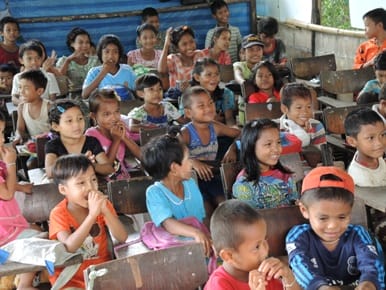
Jan 13, 2017 | Focolare Worldwide
 One of my acquaintances, years ago said: “wherever there are the poor, money also abounds.” I was young then and didn’t believe in those words: after 26 years in Asia, I realised to my dismay, that this is true also in Mae Sot. Notwithstanding any type of sustainable development or minimum respect for man and nature, paths are paved, and projects are springing up to bring the big industries, relocating them from where they find difficulty in being productive or are kicked out because it is illicit and dangerous for people’s health. All this is because there is a “work force” at low cost, very low, if not at zero cost; and on the other hand, there are the very wealthy people, ready to exploit the situation. The poor cross the border from Myanmar to Thailand, to escape from hunger and the discomforts of a country that is still struggling to reach social equality and protect the less fortunate classes or those of other religions. People are continuously expelled at the checkpoint and there are shooting incidents, with the children bearing the brunt of it all. There is a growing number of orphans, disabled and abandoned children, or those left alone at home while their parents are at work in the plantations. It is really sad to see children suffering! And Mae Sot is full of them. This is why we are trying to do something for them through our project. Every time we go to that area, we find our “special spots”: the orphanages, isolated homes in the countryside, and our little school Goccia dopo Goccia (Drop by Drop) with about 60 students: the places where you see so many of those kids with big black eyes that mark your soul indelibly. Our project is now in its 6th year (even if we have been helping the Karen people for decades) and reaches about 250 people in three countries (Thailand, Laos and Vietnam). All are direct and concrete micro projects for families often living below the minimum subsistence threshold. Their needs? Certainly food, clothes, but above all, love which means care, a smile, a bit of attention, in short: someone who says “how are you?” That means meeting people who know how to share the sufferings of a migrant population that is worth very little in the eyes of the rich, and is thus exploited. This is what we are trying to do: helping them, staying by their side, and giving relief, hope and warmth. Through our local contact person our aid reaches them monthly. Every three months we do the rounds of our projects, visiting them to make them feel that they have not been abandoned. They often say, “The fact that you travel so far to come and visit, gives us the strength and determination to go on living.” Those black eyes and unsmiling faces say more than a thousand words. They remind us of the works of Chiara Lubich who inspired our project: “Bring to me all the lonely people.” And we feel that these lonely people are all “ours” because they are images of the face of Jesus who continues to cry out on the Cross asking for all the love we can give. This is the sense of our project, but even more, it is our intimate joy. By: Luigi Butori For those who wish to join in the project: Banca Cantonale dei Grigioni, 7002 Coira IBAN-Nr: CH19 0077 4010 2957 6490 0 Goccia dopo Goccia Residenza Ragazzi 196a CH 7742 Poschiavo, Svizzera e mail: gica.ceccarelli@bluewin.ch oppure gocciadopogoccia.ms@gmail.com Association recognised by the tax administration of the Grigione district. Donations can be detracted from taxes..
One of my acquaintances, years ago said: “wherever there are the poor, money also abounds.” I was young then and didn’t believe in those words: after 26 years in Asia, I realised to my dismay, that this is true also in Mae Sot. Notwithstanding any type of sustainable development or minimum respect for man and nature, paths are paved, and projects are springing up to bring the big industries, relocating them from where they find difficulty in being productive or are kicked out because it is illicit and dangerous for people’s health. All this is because there is a “work force” at low cost, very low, if not at zero cost; and on the other hand, there are the very wealthy people, ready to exploit the situation. The poor cross the border from Myanmar to Thailand, to escape from hunger and the discomforts of a country that is still struggling to reach social equality and protect the less fortunate classes or those of other religions. People are continuously expelled at the checkpoint and there are shooting incidents, with the children bearing the brunt of it all. There is a growing number of orphans, disabled and abandoned children, or those left alone at home while their parents are at work in the plantations. It is really sad to see children suffering! And Mae Sot is full of them. This is why we are trying to do something for them through our project. Every time we go to that area, we find our “special spots”: the orphanages, isolated homes in the countryside, and our little school Goccia dopo Goccia (Drop by Drop) with about 60 students: the places where you see so many of those kids with big black eyes that mark your soul indelibly. Our project is now in its 6th year (even if we have been helping the Karen people for decades) and reaches about 250 people in three countries (Thailand, Laos and Vietnam). All are direct and concrete micro projects for families often living below the minimum subsistence threshold. Their needs? Certainly food, clothes, but above all, love which means care, a smile, a bit of attention, in short: someone who says “how are you?” That means meeting people who know how to share the sufferings of a migrant population that is worth very little in the eyes of the rich, and is thus exploited. This is what we are trying to do: helping them, staying by their side, and giving relief, hope and warmth. Through our local contact person our aid reaches them monthly. Every three months we do the rounds of our projects, visiting them to make them feel that they have not been abandoned. They often say, “The fact that you travel so far to come and visit, gives us the strength and determination to go on living.” Those black eyes and unsmiling faces say more than a thousand words. They remind us of the works of Chiara Lubich who inspired our project: “Bring to me all the lonely people.” And we feel that these lonely people are all “ours” because they are images of the face of Jesus who continues to cry out on the Cross asking for all the love we can give. This is the sense of our project, but even more, it is our intimate joy. By: Luigi Butori For those who wish to join in the project: Banca Cantonale dei Grigioni, 7002 Coira IBAN-Nr: CH19 0077 4010 2957 6490 0 Goccia dopo Goccia Residenza Ragazzi 196a CH 7742 Poschiavo, Svizzera e mail: gica.ceccarelli@bluewin.ch oppure gocciadopogoccia.ms@gmail.com Association recognised by the tax administration of the Grigione district. Donations can be detracted from taxes..
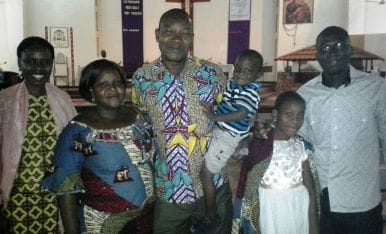
Jan 11, 2017 | Focolare Worldwide
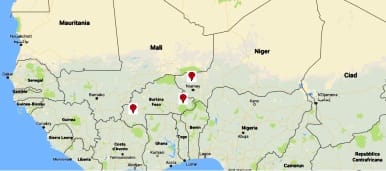 “We’ve just completed our journey that took us from Bobo-Dioulasso to Dorì, the most northern city of Burkina Faso; and then it was on to Niamey in Niger. The objective was to respond to the community that has gathered in the Focolare spirit to share experiences and the first fruits of life that have begun to spread in these lands of the Sahel.” This is how focolarini Aurora and Pascal from the focolare in Bobo Dioulasso begin their recount. Bobo Dioulasso is the second largest city in Burkina Faso and the headquarters of the local Focolare Movement . Burkina with its 17 million inhabitants (50% Muslim, 30% Christian and 20% traditional religions) is one of the poorest countries in the world, along with nearby Niger. “We reached Niamey, the capital of Niger, where we were welcomed with much joy by the community, including Archbishop Laurent Lompo who became a priest, he says, because of the first Mariapolis he attended. Archbishop Lompo is a real shepherd, close to his people and very concrete in his love. He shared with us his many experiences of friendship and dialogue with Muslims who make up 93% of the population of 10 million people. The relationship of the Christians with the Muslim world is a challenge, especially after January 17, 2015 when Islamist extremists burned more than 70 Christian churches following the Charlie Hebdo attacks in Paris.”
“We’ve just completed our journey that took us from Bobo-Dioulasso to Dorì, the most northern city of Burkina Faso; and then it was on to Niamey in Niger. The objective was to respond to the community that has gathered in the Focolare spirit to share experiences and the first fruits of life that have begun to spread in these lands of the Sahel.” This is how focolarini Aurora and Pascal from the focolare in Bobo Dioulasso begin their recount. Bobo Dioulasso is the second largest city in Burkina Faso and the headquarters of the local Focolare Movement . Burkina with its 17 million inhabitants (50% Muslim, 30% Christian and 20% traditional religions) is one of the poorest countries in the world, along with nearby Niger. “We reached Niamey, the capital of Niger, where we were welcomed with much joy by the community, including Archbishop Laurent Lompo who became a priest, he says, because of the first Mariapolis he attended. Archbishop Lompo is a real shepherd, close to his people and very concrete in his love. He shared with us his many experiences of friendship and dialogue with Muslims who make up 93% of the population of 10 million people. The relationship of the Christians with the Muslim world is a challenge, especially after January 17, 2015 when Islamist extremists burned more than 70 Christian churches following the Charlie Hebdo attacks in Paris.”  “Archbishop Lompo suggested that we also visit a woman in Hawa who had once attended Focolare events but now, for family reasons, had become a Muslim. Surprised and moved by our visit, she told us about her family and the beautiful hours together in the Mariapolis. When she heard that there would be another Mariapolis in the area, she promised that she would start preparig to be there. It was so beautiful to see in her and so many other Muslims that we met, their joy at being able to live in the City of Mary (Mariapolis) the experience of mutual love.” “Lastly, we visited a small community in Niamey; such deep people, desirous to live the Gospel and go forward in the experience of unity. Maybe our visit encouraged them on that path. One of them said to us in the name of everyone else: “It’s true that here in Africa we have to live so many difficult situations, but with the spirituality of Chiara Lubich we learn to love others, taking on their suffering and pain. How much I want this ideal of brotherhood to invade the Church and our country’s society!” Aurora De Oliveira and Pascal Pontien Ntawuyankira
“Archbishop Lompo suggested that we also visit a woman in Hawa who had once attended Focolare events but now, for family reasons, had become a Muslim. Surprised and moved by our visit, she told us about her family and the beautiful hours together in the Mariapolis. When she heard that there would be another Mariapolis in the area, she promised that she would start preparig to be there. It was so beautiful to see in her and so many other Muslims that we met, their joy at being able to live in the City of Mary (Mariapolis) the experience of mutual love.” “Lastly, we visited a small community in Niamey; such deep people, desirous to live the Gospel and go forward in the experience of unity. Maybe our visit encouraged them on that path. One of them said to us in the name of everyone else: “It’s true that here in Africa we have to live so many difficult situations, but with the spirituality of Chiara Lubich we learn to love others, taking on their suffering and pain. How much I want this ideal of brotherhood to invade the Church and our country’s society!” Aurora De Oliveira and Pascal Pontien Ntawuyankira
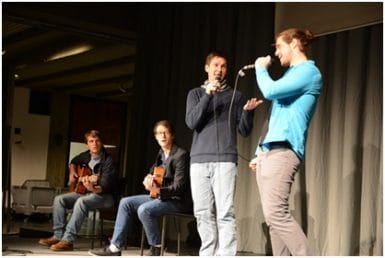
Jan 7, 2017 | Focolare Worldwide, Senza categoria
 An enriching evening of classical, dance, pop, contemplative, jazz, a musical and a buffet. The fourth edition of the benefit concert was promoted by the Focolare’s Youth for a United World in Vienna and by young people from Mor Efrem of the Syro-Orthodox community. Two hundred people showed up in spite of the freezing night temperatures of December, to support Syrian refugees. The “Singing Voices Choir” comprised of young people that included some Spanish speakers wished everyone a “Feliz Navidad” with song and dance. David Watzl presented Aktion Weitblick, a project that offers aid to refugees inside Europe and on its borders. He had spent two weeks at a refugee camp in Turkey where, with a group of volunteers from Aktion Weitblick, he organized afternoon games for children, classes in hygiene and many other activities. The Ishtar Syrian Dance Group brought the concert to a close with lively eastern dance that got the whole audience moving. Afterwards, a tasty buffet provided an opportunity for actors, visitors and refugees to mingle and know one another, and to plan future projects. The evening ended in a warm and fraternal atmosphere. Compiled by Young for Unity, Vienna, Austria
An enriching evening of classical, dance, pop, contemplative, jazz, a musical and a buffet. The fourth edition of the benefit concert was promoted by the Focolare’s Youth for a United World in Vienna and by young people from Mor Efrem of the Syro-Orthodox community. Two hundred people showed up in spite of the freezing night temperatures of December, to support Syrian refugees. The “Singing Voices Choir” comprised of young people that included some Spanish speakers wished everyone a “Feliz Navidad” with song and dance. David Watzl presented Aktion Weitblick, a project that offers aid to refugees inside Europe and on its borders. He had spent two weeks at a refugee camp in Turkey where, with a group of volunteers from Aktion Weitblick, he organized afternoon games for children, classes in hygiene and many other activities. The Ishtar Syrian Dance Group brought the concert to a close with lively eastern dance that got the whole audience moving. Afterwards, a tasty buffet provided an opportunity for actors, visitors and refugees to mingle and know one another, and to plan future projects. The evening ended in a warm and fraternal atmosphere. Compiled by Young for Unity, Vienna, Austria
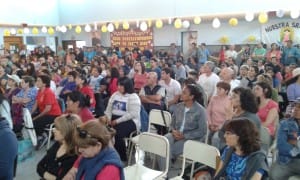
Jan 4, 2017 | Focolare Worldwide, Senza categoria
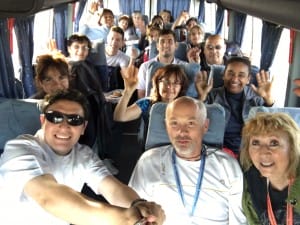 Per raggiungere Gan Gan, un villaggio che dista da Trelew poco più di 300 km, occorrono, bel tempo permettendo, 6/7 ore di viaggio. Si devono infatti affrontare i pendii della meseta di Chubut, che qui sono particolarmente impervi. In genere sono in pochi a visitare Gan Gan, che con i suoi 800 abitanti, a maggioranza indigeni mapuches e tehuelches, si è tristemente guadagnato la fama di “villaggio dimenticato da tutti”. Il 19 e 20 novembre scorso, proprio a Gan Gan si è tenuta una missione, con la partecipazione di persone venute da parrocchie e da realtà associative di Trelew. Durante il viaggio, la comitiva approfitta per rinsaldare la conoscenza reciproca e riflettere sul significato di questo spingersi verso i più poveri in risposta all’appello di papa Francesco. Ad attenderli, la festosa accoglienza della gente, con i suoi canti tipici, mentre un sacerdote li introduce nella realtà di questo tratto di altopiano dove sono ancora presenti miniere che vengono lavorate a cielo aperto, con gravi conseguenze per la contaminazione dell’ambiente. A fare gli onori di casa è un’anziana del villaggio, che nella sua lingua mapuche dà il benvenuto e presenta mons. Croxatto, vescovo ausiliare di Comodoro Rivadavia anch’egli venuto per la missione. Si inizia con la celebrazione di 5 battesimi. «Il sogno di uno di questi bambini, che ha già 4 anni – racconta una focolarina che fa parte della comitiva –, era di essere battezzato da papa Francesco. Il vescovo, ornato da tutti i paramenti, con grande amore gli spiega che il Papa è impossibilitato a venire fin quassù, ma che aveva conferito a lui il mandato di battezzarlo. Alla cerimonia è seguito un pranzo con cibo generosamente portato dalla gente e condiviso fra tutti». Poi i missionari iniziano a percorrere, in preghiera, l’intero villaggio: «Una processione che per gli scenari che si presentano ai nostri occhi – racconta un’altra focolarina presente – sembra una Via Crucis. La gente è disposta lungo la strada e racconta drammi di abbandono, solitudine, violenza, mancanza di giustizia: dalla mamma cui hanno ucciso il figlio, a quella il cui figlio è desaparecido, dalla poverissima casa di ricovero per anziani, alla cappella in desolante abbandono. Ciò che fa più impressione sono i volti della gente, anzitempo solcati da rughe di dolore e di stenti. Impressionante anche la quantità di persone che desiderano confessarsi. I sacerdoti ascoltano ininterrottamente le loro confessioni mentre la processione procede silenziosa. Altro momento forte è la messa della prima comunione con la cresima a 15 persone, alcune adulte e addirittura già nonne. A vedere come i sacerdoti si prodigano in questa realtà socialmente così lacerata, a come cercano di farsi vicini ai problemi della gente, tornano alla mente le parole di papa Francesco quando dice che i pastori debbono avere addosso l’odore delle loro pecore».
Per raggiungere Gan Gan, un villaggio che dista da Trelew poco più di 300 km, occorrono, bel tempo permettendo, 6/7 ore di viaggio. Si devono infatti affrontare i pendii della meseta di Chubut, che qui sono particolarmente impervi. In genere sono in pochi a visitare Gan Gan, che con i suoi 800 abitanti, a maggioranza indigeni mapuches e tehuelches, si è tristemente guadagnato la fama di “villaggio dimenticato da tutti”. Il 19 e 20 novembre scorso, proprio a Gan Gan si è tenuta una missione, con la partecipazione di persone venute da parrocchie e da realtà associative di Trelew. Durante il viaggio, la comitiva approfitta per rinsaldare la conoscenza reciproca e riflettere sul significato di questo spingersi verso i più poveri in risposta all’appello di papa Francesco. Ad attenderli, la festosa accoglienza della gente, con i suoi canti tipici, mentre un sacerdote li introduce nella realtà di questo tratto di altopiano dove sono ancora presenti miniere che vengono lavorate a cielo aperto, con gravi conseguenze per la contaminazione dell’ambiente. A fare gli onori di casa è un’anziana del villaggio, che nella sua lingua mapuche dà il benvenuto e presenta mons. Croxatto, vescovo ausiliare di Comodoro Rivadavia anch’egli venuto per la missione. Si inizia con la celebrazione di 5 battesimi. «Il sogno di uno di questi bambini, che ha già 4 anni – racconta una focolarina che fa parte della comitiva –, era di essere battezzato da papa Francesco. Il vescovo, ornato da tutti i paramenti, con grande amore gli spiega che il Papa è impossibilitato a venire fin quassù, ma che aveva conferito a lui il mandato di battezzarlo. Alla cerimonia è seguito un pranzo con cibo generosamente portato dalla gente e condiviso fra tutti». Poi i missionari iniziano a percorrere, in preghiera, l’intero villaggio: «Una processione che per gli scenari che si presentano ai nostri occhi – racconta un’altra focolarina presente – sembra una Via Crucis. La gente è disposta lungo la strada e racconta drammi di abbandono, solitudine, violenza, mancanza di giustizia: dalla mamma cui hanno ucciso il figlio, a quella il cui figlio è desaparecido, dalla poverissima casa di ricovero per anziani, alla cappella in desolante abbandono. Ciò che fa più impressione sono i volti della gente, anzitempo solcati da rughe di dolore e di stenti. Impressionante anche la quantità di persone che desiderano confessarsi. I sacerdoti ascoltano ininterrottamente le loro confessioni mentre la processione procede silenziosa. Altro momento forte è la messa della prima comunione con la cresima a 15 persone, alcune adulte e addirittura già nonne. A vedere come i sacerdoti si prodigano in questa realtà socialmente così lacerata, a come cercano di farsi vicini ai problemi della gente, tornano alla mente le parole di papa Francesco quando dice che i pastori debbono avere addosso l’odore delle loro pecore».  Nel viaggio di ritorno viene creato un gruppo whatsapp perché tutti vogliono che l’esperienza della missione non finisca qui. Molti dicono che a Gan Gan bisogna tornare, colpiti dall’esperienza forte e profonda di essersi sentiti – pastori e laici – un unico popolo di Dio. E per aver vissuto, insieme, l’esperienza di “uscire” come Chiesa per incontrare i più deboli. Toccante l’esperienza condivisa da uno dei sacerdoti che durante il pranzo comunitario era andato a far visita ai parenti di una signora di Trelew nativa di Gan Gan. «L’impatto è stato molto forte – racconta –. Erano due fratelli di 83 e 81 anni ambedue sordi: la signora al 90% e il fratello, non vedente al 100%. Vivono in una stanza di due metri per due, con i due letti disposti a L. La porta è quasi inesistente e il pavimento di nuda terra. Il freddo che entra dalla porta e quello che affiora dal pavimento, non fa che accentuare l’artrosi di cui soffre la donna. Nel cuore mi è rimasta una ferita. Penso che la missione, che pure è andata bene, non avrebbe senso se non facciamo qualcosa per dare dignità a questi indigenti». Alla sera già arrivano le prime risposte via whatsapp al parroco: «Abbiamo trovato i soldi per rifare la porta. Mandaci le misure». Fonte: Focolares Cono Sur online
Nel viaggio di ritorno viene creato un gruppo whatsapp perché tutti vogliono che l’esperienza della missione non finisca qui. Molti dicono che a Gan Gan bisogna tornare, colpiti dall’esperienza forte e profonda di essersi sentiti – pastori e laici – un unico popolo di Dio. E per aver vissuto, insieme, l’esperienza di “uscire” come Chiesa per incontrare i più deboli. Toccante l’esperienza condivisa da uno dei sacerdoti che durante il pranzo comunitario era andato a far visita ai parenti di una signora di Trelew nativa di Gan Gan. «L’impatto è stato molto forte – racconta –. Erano due fratelli di 83 e 81 anni ambedue sordi: la signora al 90% e il fratello, non vedente al 100%. Vivono in una stanza di due metri per due, con i due letti disposti a L. La porta è quasi inesistente e il pavimento di nuda terra. Il freddo che entra dalla porta e quello che affiora dal pavimento, non fa che accentuare l’artrosi di cui soffre la donna. Nel cuore mi è rimasta una ferita. Penso che la missione, che pure è andata bene, non avrebbe senso se non facciamo qualcosa per dare dignità a questi indigenti». Alla sera già arrivano le prime risposte via whatsapp al parroco: «Abbiamo trovato i soldi per rifare la porta. Mandaci le misure». Fonte: Focolares Cono Sur online

 I came across a letter of Fr. Christian de Chergé a few days ago, on his 20th death anniversary. Christian was the Prior of the community of Trappist monks of the monastery of Nostra Signora dell’Atlas in Tibhirine (90 km from Algiers). In 1996, he and six other monks were kidnapped and then killed. On 1 August, Bishop Pierre Claverie, the Bishop of Orano was killed. That was really a “black decade,” as people called the civil war that exploded in the1990s. The monks were French and like the other “foreigners” were the direct targets of the “ mountain brothers,” name that referred to all those who had gone into hiding to take up their arms following the annulment of the 1992 elections. The Islamic Salvation Front, a political party that was dispersed and declared illegal, was about to win the elections. In my mind I often see their smiling faces, during those moments we lived together. We all took part in that particular vocation of the Church in that country, to which we felt we had been sent to testify to the Gospel, at the service of those people. It was a simple, poor Church, but its testimony shone in the hearts of many friends, mostly Muslims. Already then in Algiers, 99.99% of the population followed Islam. The Archbishop of Algiers, Paul Desfarges, said that, “The Church is for the people, a Church of Encounters.” But going back to the letter of 3 December 1994, it seemed to me like meeting Christian once again, or one of the monks in our focolare house in Tlemcen, where they used to spend a night, to then resume the journey towards the monastery they were about to found in Fèz, Morocco. Those were evenings of intense dialogue and joy of getting together, feeling like brothers and of sharing and understanding, in this mutual commitment toward the people that hosted us. Even if we had different callings, our hearts beat in unison.
I came across a letter of Fr. Christian de Chergé a few days ago, on his 20th death anniversary. Christian was the Prior of the community of Trappist monks of the monastery of Nostra Signora dell’Atlas in Tibhirine (90 km from Algiers). In 1996, he and six other monks were kidnapped and then killed. On 1 August, Bishop Pierre Claverie, the Bishop of Orano was killed. That was really a “black decade,” as people called the civil war that exploded in the1990s. The monks were French and like the other “foreigners” were the direct targets of the “ mountain brothers,” name that referred to all those who had gone into hiding to take up their arms following the annulment of the 1992 elections. The Islamic Salvation Front, a political party that was dispersed and declared illegal, was about to win the elections. In my mind I often see their smiling faces, during those moments we lived together. We all took part in that particular vocation of the Church in that country, to which we felt we had been sent to testify to the Gospel, at the service of those people. It was a simple, poor Church, but its testimony shone in the hearts of many friends, mostly Muslims. Already then in Algiers, 99.99% of the population followed Islam. The Archbishop of Algiers, Paul Desfarges, said that, “The Church is for the people, a Church of Encounters.” But going back to the letter of 3 December 1994, it seemed to me like meeting Christian once again, or one of the monks in our focolare house in Tlemcen, where they used to spend a night, to then resume the journey towards the monastery they were about to found in Fèz, Morocco. Those were evenings of intense dialogue and joy of getting together, feeling like brothers and of sharing and understanding, in this mutual commitment toward the people that hosted us. Even if we had different callings, our hearts beat in unison.  That atmosphere of danger surrounding us, encouraged us to go ahead. In fact, there was talk about a possible momentous departure of the members of the focolare of Tlemcen, which then did not occur. And Christian had written: «We all thought that you would stay longer to testify to a convivial offer, a boundless sharing of life, and a friendly openness that enables our hearts to vibrate in unison beyond the barriers of religious affiliations. You made the message of the Gospel your very own and you have deeply imprinted this message among us. And we rejoice with you for this greater humanity which your Charism has given to our Church. It was such a joy to meet at your “focolare” house. Many monks were able to make use of your hospitality when they passed through on their way to Fez. All of us still savour the thought of experiencing it all again! In these times we all need to be able to count on this “fire” kept alive in the common room. It will be a bit colder at Christmas if you will no longer be here… Our lives are in God’s hands… and our motives to remain, conform to those that have allowed us to live here. For you, as for us, the situation has not changed. THANKS once again to each of you and our fraternal communion today and for always. Christian». We had talked about the courage to remain… but for those who, like us had lived that harsh situation in person, I would rather speak of the courage to remain faithful to a calling and share it with a section of humanity, which we already felt an integral part of. It was a Fidelity of love. In the hearts of those who knew the monks, Bishop Claverie, or the other nuns and religious killed in those years in Algiers, they continue to speak to us of the Gospel lived and deep friendships with a people they had made their own. Giorgio Antoniazzi
That atmosphere of danger surrounding us, encouraged us to go ahead. In fact, there was talk about a possible momentous departure of the members of the focolare of Tlemcen, which then did not occur. And Christian had written: «We all thought that you would stay longer to testify to a convivial offer, a boundless sharing of life, and a friendly openness that enables our hearts to vibrate in unison beyond the barriers of religious affiliations. You made the message of the Gospel your very own and you have deeply imprinted this message among us. And we rejoice with you for this greater humanity which your Charism has given to our Church. It was such a joy to meet at your “focolare” house. Many monks were able to make use of your hospitality when they passed through on their way to Fez. All of us still savour the thought of experiencing it all again! In these times we all need to be able to count on this “fire” kept alive in the common room. It will be a bit colder at Christmas if you will no longer be here… Our lives are in God’s hands… and our motives to remain, conform to those that have allowed us to live here. For you, as for us, the situation has not changed. THANKS once again to each of you and our fraternal communion today and for always. Christian». We had talked about the courage to remain… but for those who, like us had lived that harsh situation in person, I would rather speak of the courage to remain faithful to a calling and share it with a section of humanity, which we already felt an integral part of. It was a Fidelity of love. In the hearts of those who knew the monks, Bishop Claverie, or the other nuns and religious killed in those years in Algiers, they continue to speak to us of the Gospel lived and deep friendships with a people they had made their own. Giorgio Antoniazzi







